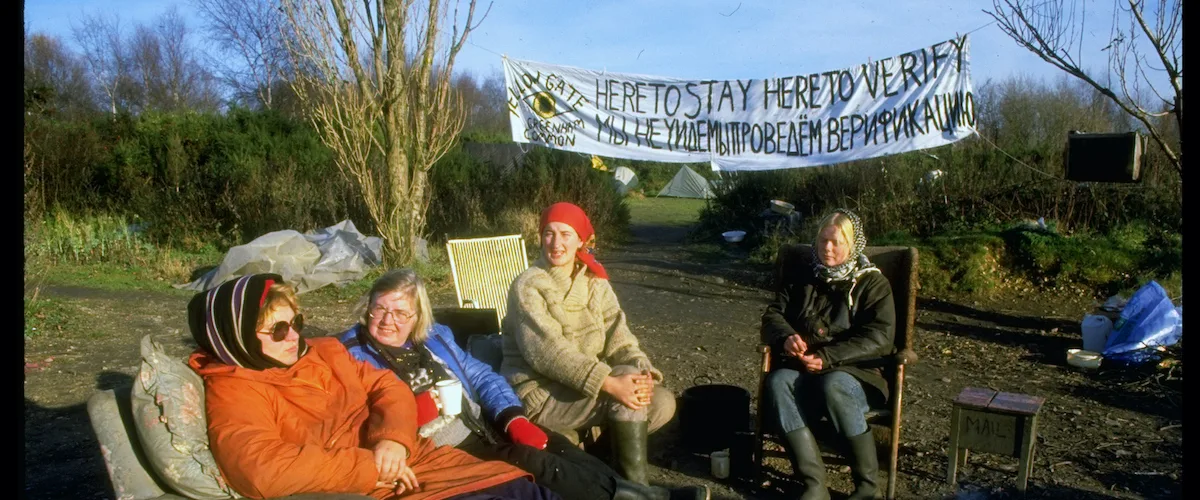History books credit former Soviet leader Mikhail Gorbachev with the end of the Cold War and the movements toward democracy and freedom of the press that led to the breaking up of the USSR. He was awarded the Nobel Peace Prize for “his leading role in the peace process.” Credit is also given to US President Ronald Reagan, with many historians believing his escalation of defense spending and tough talk—he called the USSR an “evil empire”—put intolerable pressure on the Soviet economy. But when Gorbachev was asked what made it possible for him to trust Reagan enough to enter into peace talks, he gave credit to a group not mentioned in history books or recognized in Oslo: the women’s peace camp at Greenham Common in the United Kingdom.
News media and historians focus on stories about powerful individual heroes and villains because it’s simpler, and perhaps because we like to imagine ourselves as capable of bringing about change by standing up at just the right moment. But as anthropologist Margaret Mead said, “Never doubt that a small group of thoughtful, committed citizens can change the world; indeed, it’s the only thing that ever has.” “Mothers of the Revolution” is the story of one such group, the one Gorbachev acknowledged with gratitude, and it is a welcome and long overdue opportunity to recognize their contribution.
The peace began in 1981, when 96 American Tomahawk Cruise missiles were sent to Greenham Common air base in Southeast England. Each one was four times as powerful as the bomb dropped on Hiroshima in WWII. They were a part of a hawkish defense and national security strategy called Mutual Assured Destruction. The idea is that the best deterrence to the use of weapons of mass destruction is to make sure that if any country deploys them, they will be wiped out, too. The Dr. Strangelove-esque acronym is MAD, originally intended to be ironic when it was first used by military analyst Donald Brennan, but later adopted as a legitimate policy.
The protest about the Tomahawk missiles in particular and the nuclear build-up in general began with a small group of mothers in Wales, who decided to organize a march to Greenham Common. They walked 120 miles in 10 days. At first, they did not have much of an impact. The headlines at the time were more concerned with the royal wedding of Prince Charles and Diana Spencer and the birth of a baby panda. Hilariously, when they showed up at the base, they were mistaken for a cleaning crew. They were inexperienced. “I was out of my comfort zone,” one tells us. “I’d never done anything political.” They were making it up as they went along.
The first indicator they had some support was when they put out a call for an “Embrace the Base” protest, a “crazy, audacious idea,” with enough women to encircle the entire facility. This was long before social media, before cell phones. But they got the word out and 35,000 women linked hands and surrounded the base. And then they had another crazy, audacious idea: “I think we should go to Russia.” It was risky for them and riskier for the women’s group in the USSR that was calling for disarmament. But as the world leaders, especially Reagan and Margaret Thatcher, were using extreme rhetoric about the USSR and the Doomsday Clock was getting closer to midnight, the Greenham Common women “took a more nuanced view.”
They had that nuanced view for almost 20 years, during the missiles’ arrival and after they were removed and the land was returned to the community. There will be a memorial to the Women’s Peace Camp.
Dame Glenda Jackson, a two-time Oscar-winning actress and former Member of Parliament, provides the film’s fine, sometimes stirring, narration. But it’s the voices of the women themselves, in some archival footage and contemporary interviews, that are the heart of the film. Their voices are steady as they recall challenges from camping out to arrests and police brutality to the wrenching decision to leave the care of their children to others as they fight for a world where those children can grow up safely. They speak about the way defying expectations by working for change in the world opened up new ways to change in their own lives.
However, some re-creations in the documentary range between superfluous and distracting; they do not come close to the simple dignity and immeasurable courage of the women.
There are dozens of small, illuminating details and some surprising guest appearances in the film, especially over the end credits, when the Peace Camp is tied to today’s protests by people like Malala Yousafzai and Greta Thunberg. “Mothers of the Revolution” reminds us to value all those whose dedication and courage is too seldom recognized.
Now available on digital platforms.




















